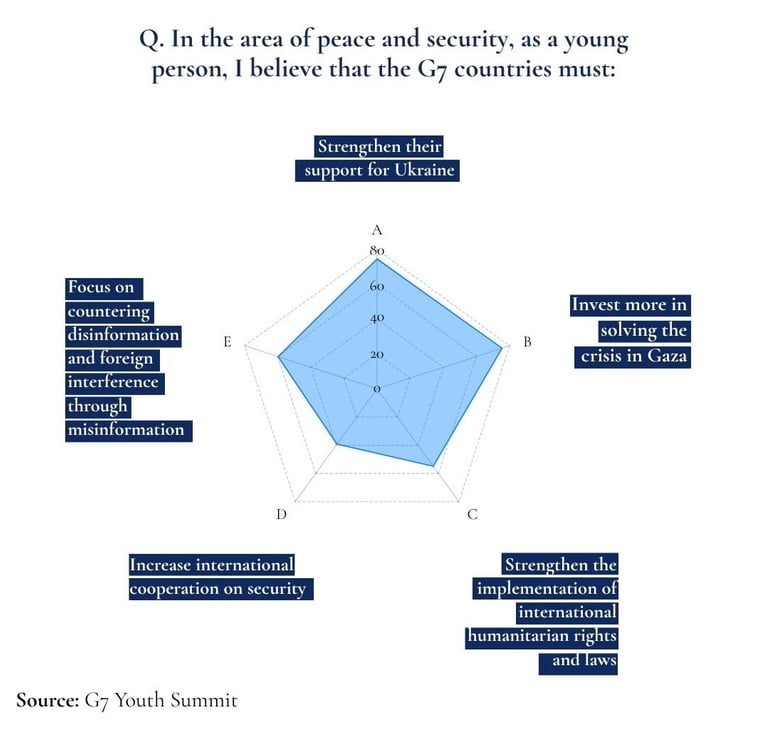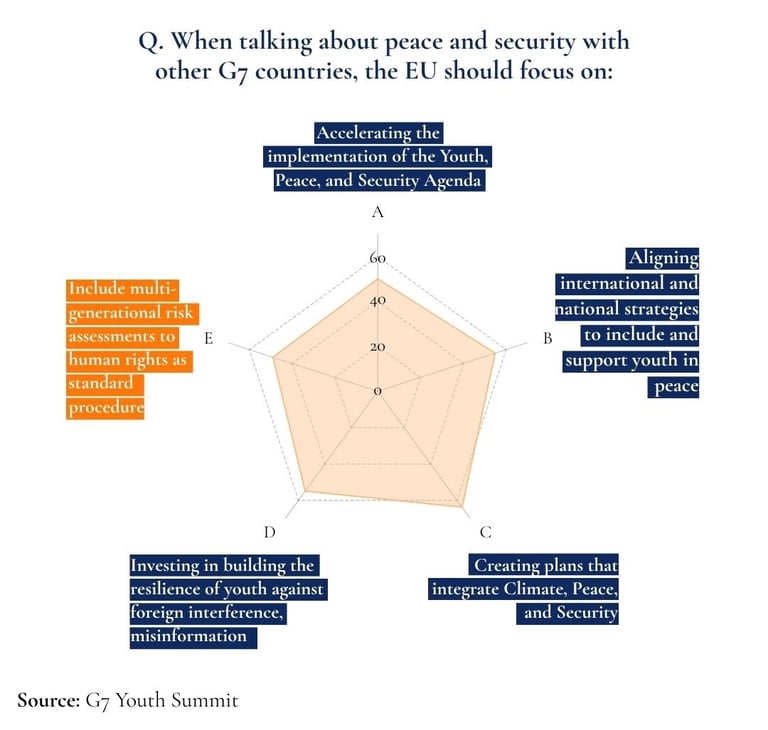Explainer: What is the G7 Youth Summit?
In a world riddled with crises – rising temperatures, cyber threats, fragile economies, and fraying peace, it’s easy to think that young people are mere by-standers in the grand game of global politics. But in Ottawa, Canada, the Youth 7 Summit 2025 is reminding the world of one truth: “the future isn’t a far-off idea – it’s already here, demanding a seat at the table.”
Hansika Sah and Divya Padigapati
8/11/20255 min read


In a world riddled with crises – rising temperatures, cyber threats, fragile economies, and fraying peace, it’s easy to think that young people are mere by-standers in the grand game of global politics. But in Ottawa, Canada, the Youth 7 Summit 2025 is reminding the world of one truth: “the future isn’t a far-off idea – it’s already here, demanding a seat at the table.”
As the official youth engagement group of G7, the Y7 brings together delegates from 7 nations and the European Union annually. Discussions on the world’s most pressing issues are held – and bold, youth-driven policy recommendations are drafted to be delivered directly to G7 leaders.
The Y7 isn’t just a training ground for future diplomats. At a time when international institutions are often seen as elitist and out of touch, the Y7 is a rare space where idealism meets pragmatism. This is where policy meets passion. It’s where the next generation doesn't ask for a seat at the table – they build a new one.
Sensitive and strategic topics such as the Russia-Ukraine conflict and the Israel-Palestine war were also brought up to garner opinions of the youth.
The EU Youth Priorities poll depicts a clear bias of the youth towards a growing climate and security nexus, as opposed to the historical tendency of allowing the two terms to operate in silos.
The Communique for Youth 7 2025 outlined four policy tracks: AI & Digital Technology, Energy & Environment, Supply Chains, and Peace & Security.
Track 1: Artificial Intelligence and Digital Technology
Young people today navigate a digital world rife with disinformation, data exploitation, and online abuse—threatening democratic values and personal safety. We urge the G7 to enforce algorithmic transparency, mandate AI content labelling, uphold data ownership rights and regulate platform accountability. Investing in AI education, digital literacy, and future-proof skills is vital. Global cooperation on AI governance and accountability is key to protecting and empowering the next generation.
Track 2: Economy and Supply Chain Resilience
G7 economies must address rising inequality, unsustainable debt (120% avg. debt-to-GDP), and youth unemployment through progressive taxation—including BEPS implementation, windfall taxes, and wealth taxes.
To build resilient labour markets, leaders must promote youth mobility, work-integrated learning, cross-border credential recognition, and gender-inclusive policies. A G7 Social Pact must tackle demographic decline via childcare access, affordable housing, and retirement reform. Scaling blended finance, restoring WTO credibility, and safeguarding economic sovereignty are vital for equitable, future-ready growth.
Track 3: Energy and Enviroments
To secure a just energy transition, G7 must prioritize renewables financing, enforce legally binding climate targets, and ensure ethical critical mineral sourcing using FPIC-aligned traceability. Establishing a Renewable Energy Fund, advancing energy storage and efficiency, and empowering low-carbon SMEs is essential. Leaders must combat PFAS pollution, protect biodiversity and forests, and fund ocean health via coordinated, science-backed environmental finance.
A circular, youth-centered economy demands green skill-building, plastics lifecycle regulation, and a moratorium on seabed mining. Empower youth through climate entrepreneurship platforms and Just Transition partnerships with Emerging Market and Developing Economies.
Track 4: Peace and Security
To advance global peace and justice, G7 must institutionalize the Youth, Peace, and Security (YPS) agenda via fully funded National Action Plans (NAP), youth-inclusive peacebuilding, and anti-MDH capacity building. Integrate Climate-Related Security Risks (CRSR) and uphold human rights through anticipatory action, traceable conflict mineral regulations, and protection for journalists, IDPs, and whistleblowers.
Strengthen the Rules-Based International Order (RBIO) by conditioning partnerships on international law adherence and sustaining unconditional support for Ukraine. Champion youth-led disarmament, universal NPT ratification by 2050, and inclusive transitional justice rooted in human rights and local leadership.






In a world riddled with crises – rising temperatures, cyber threats, fragile economies, and fraying peace, it’s easy to think that young people are mere by-standers in the grand game of global politics. But in Ottawa, Canada, the Youth 7 Summit 2025 is reminding the world of one truth: “the future isn’t a far-off idea – it’s already here, demanding a seat at the table.”
As the official youth engagement group of G7, the Y7 brings together delegates from 7 nations and the European Union annually. Discussions on the world’s most pressing issues are held – and bold, youth-driven policy recommendations are drafted to be delivered directly to G7 leaders.
The Y7 isn’t just a training ground for future diplomats. At a time when international institutions are often seen as elitist and out of touch, the Y7 is a rare space where idealism meets pragmatism. This is where policy meets passion. It’s where the next generation doesn't ask for a seat at the table – they build a new one.
Sensitive and strategic topics such as the Russia-Ukraine conflict and the Israel-Palestine war were also brought up to garner opinions of the youth.
The EU Youth Priorities poll depicts a clear bias of the youth towards a growing climate and security nexus, as opposed to the historical tendency of allowing the two terms to operate in silos.
The Communique for Youth 7 2025 outlined four policy tracks: AI & Digital Technology, Energy & Environment, Supply Chains, and Peace & Security.
Track 1: Artificial Intelligence and Digital Technology
Young people today navigate a digital world rife with disinformation, data exploitation, and online abuse—threatening democratic values and personal safety. We urge the G7 to enforce algorithmic transparency, mandate AI content labelling, uphold data ownership rights and regulate platform accountability. Investing in AI education, digital literacy, and future-proof skills is vital. Global cooperation on AI governance and accountability is key to protecting and empowering the next generation.
Track 2: Economy and Supply Chain Resilience
G7 economies must address rising inequality, unsustainable debt (120% avg. debt-to-GDP), and youth unemployment through progressive taxation—including BEPS implementation, windfall taxes, and wealth taxes.
To build resilient labour markets, leaders must promote youth mobility, work-integrated learning, cross-border credential recognition, and gender-inclusive policies. A G7 Social Pact must tackle demographic decline via childcare access, affordable housing, and retirement reform. Scaling blended finance, restoring WTO credibility, and safeguarding economic sovereignty are vital for equitable, future-ready growth.
Track 3: Energy and Enviroments
To secure a just energy transition, G7 must prioritize renewables financing, enforce legally binding climate targets, and ensure ethical critical mineral sourcing using FPIC-aligned traceability. Establishing a Renewable Energy Fund, advancing energy storage and efficiency, and empowering low-carbon SMEs is essential. Leaders must combat PFAS pollution, protect biodiversity and forests, and fund ocean health via coordinated, science-backed environmental finance.
A circular, youth-centered economy demands green skill-building, plastics lifecycle regulation, and a moratorium on seabed mining. Empower youth through climate entrepreneurship platforms and Just Transition partnerships with Emerging Market and Developing Economies.
Track 4: Peace and Security
To advance global peace and justice, G7 must institutionalize the Youth, Peace, and Security (YPS) agenda via fully funded National Action Plans (NAP), youth-inclusive peacebuilding, and anti-MDH capacity building. Integrate Climate-Related Security Risks (CRSR) and uphold human rights through anticipatory action, traceable conflict mineral regulations, and protection for journalists, IDPs, and whistleblowers.
Strengthen the Rules-Based International Order (RBIO) by conditioning partnerships on international law adherence and sustaining unconditional support for Ukraine. Champion youth-led disarmament, universal NPT ratification by 2050, and inclusive transitional justice rooted in human rights and local leadership.




Revolutionising Youth Media.


